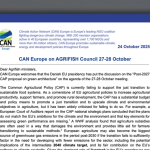In this letter CAN Europe urges Environment Ministers and national climate attachés to ensure an ambitious ETS reform and not to prematurely come to a conclusion on this file.
Dear Minister
Ahead of the Environment Council, CAN Europe, representing European NGOs working on climate change, would like to summarize our views on the reform of the Emissions Trading Scheme (ETS).
For CAN Europe it is crucial that the EU considers its climate policies as a coherent package and policies agreed under the ETS should be in line with policies agreed under the Effort Sharing Regulation to ensure climate action is as ambitious as possible. Given discussions on the Effort Sharing Regulation have only started it would be premature to come to a fixed conclusion on the ETS at this moment.
We are encouraged to hear that the Slovak Presidency has invited Member States to discuss several options to increase the impact of the ETS. Increasing ambition in the ETS is essential, not just to bring the ETS in line with the Paris commitments but also in order to turn the ETS into a functioning policy tool that actually reduces emissions. In order to do so, the carbon budget for phase 4 has to be reduced to create scarcity and to ensure a cost effective decarbonization of our economy. A combination of the proposed options by the Slovak presidency are necessary:
The new emissions budget for the ETS is determined by two key elements: the initial starting level in 2021 and the rate of emission reductions. Both measures need to be combined to ensure that the ETS reduces emissions and that no new surplus accumulates.
CAN Europe calls for an LRF of 2.8% together with a 2021 starting point for Phase IV that is set at the average 2017-2019 emissions.
Cancellation of allowances
By 2020, the ETS surplus will have grown to between 2.6 and 4.4 billion allowances. The proposed voluntary mechanism for Member States to cancel allowances is insufficient to address this very large surplus. Permanent cancellation of this surplus could bring Europe back onto the least-cost path towards its climate goals. Tightening the Linear Reduction Factor and setting the starting level in 2021 at actual emissions are the primary means of guarding against oversupply in the future, cancellation is the most efficient way of addressing historical oversupply in Europe’s carbon budgets.
CAN Europe calls for:
1. The permanent cancellation of all allowances in the Market Stability Reserve at the end of each period, starting at the end of phase 3.
2. A mandatory correction for national policies overseen by the Commission, which is permanent (i.e. cancellation) and which adjusts the allowances auctioned by all Member States, not just the Member State where the relevant national policies have been implemented. Action by any single Member State lowers the demand and lowers costs for all Member States, allowing the whole community to free-ride on their efforts. A correction to all Member State auctions should therefore be cost-neutral to national economies. Allowances should be cancelled from the market and not from the MSR in order to correct for the effects of weakened demand on the carbon price.
3. A permanent, mandatory adjustment, must also be extended to adjust for other “overlapping policies” at national and EU level that lower demand.
4. All unallocated allowances from Phase 3 to be cancelled permanently and Phase 4 allowances used for the NER. The 395 million unused Phase 3 allowances should not be used for the NER in Phase 4. Instead, the Phase 4 NER should be created with Phase 4 allowances, thereby reducing the supply of allowances available to the market and raising the EU carbon price.
Market Stability Reserve (MSR)
CAN Europe welcomes the suggestion to increase the feeding rate at which allowances are placed in the MSR but stresses that such a measure would not increase ambition in the ETS but only temporarily reduce the supply of allowances. This measure therefore cannot substitute for the measures listed above. But ensuring companies act sooner rather than later is also necessary to ensure a functioning ETS.
CAN Europe calls for doubling the feeding rate into the MSR until to total allowances in circulation fall into the MSR’s target supply band.
Price corridor
CAN Europe stresses that a price corridor is only effective if the minimum price is set sufficiently high at EUR 30, rising over time, and is accompanied by permanent measures to reduce supply and increase Europe’s ambition.
CAN Europe calls for an auctioning reserve price of €30 from 2021 which increases over time.
We call on you to recognise the urgency and depth of the climate crisis and to ensure the EU reform its flagship climate policy in a way that sets Europe on a path to meet the Paris commitments.
Kind regards,
Wendel Trio, Director CAN Europe



